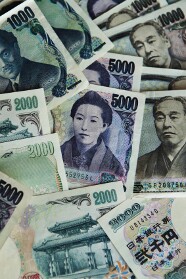The Japanese yen was the weakest major currency on the Forex market today, falling against all other most-traded rivals. Domestic macroeconomic data could not be the catalysts for the decline: it was not particularly good but not extremely terrible either. In fact, most of the reports beat expectations.
The Statistics Bureau of Japan reported that the unemployment rate was at 3.1% in October — a nominal increase from September’s value of 3.0%. Markets were expecting such a result. A report from Japan’s Ministry of Finance revealed that capital spending dropped by 10.6% in the September quarter from the same period of the previous year. While not a good result by itself, the reading was better than a drop of 11.3% registered in the previous three months and a decline of 12.0% predicted by analysts. The headline au Jibun Bank Japan Manufacturing Purchasing Managers’ Index rose from 48.7 in October to 49.0 in November according to the final estimate. Market participants were expecting the same reading of 48.3 as in the preliminary report. The index remained below the neutral 50.0 level, though moved close to it, meaning that the sector was still contracting but the contraction was only marginal.
One of the possible reasons for the yen’s decline could be the positive general market sentiment. Being a safe-haven currency, the yen usually performs poorly when traders feel optimistic. But the Swiss franc, which is also considered to be a safe currency, managed to gain today, therefore it is unclear how much the traders’ sentiment was affecting currencies during Tuesday’s trading.
USD/JPY edged up from 104.31 to 104.39 as of 16:41 GMT today. EUR/JPY surged from 124.41 to 125.65. CHF/JPY soared from 114.80 to 115.85.
If you have any questions, comments, or opinions regarding the Japanese Yen, feel free to post them using the commentary form below.

Yen Weakest Despite Better-than-Expected Domestic Reports
More from NewsMore posts in News »


Be First to Comment